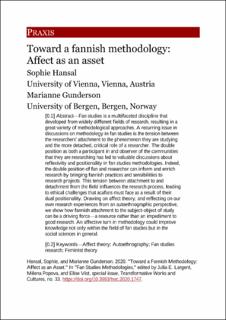| dc.contributor.author | Gunderson, Marianne | |
| dc.contributor.author | Hansal, Soprhie | |
| dc.date.accessioned | 2021-07-01T11:45:35Z | |
| dc.date.available | 2021-07-01T11:45:35Z | |
| dc.date.created | 2021-01-31T16:52:51Z | |
| dc.date.issued | 2020 | |
| dc.identifier.issn | 1941-2258 | |
| dc.identifier.uri | https://hdl.handle.net/11250/2762817 | |
| dc.description.abstract | Fan studies is a multifaceted discipline that developed from widely different fields of research, resulting in a great variety of methodological approaches. A recurring issue in discussions on methodology in fan studies is the tension between the researchers' attachment to the phenomenon they are studying and the more detached, critical role of a researcher. The double position as both a participant in and observer of the communities that they are researching has led to valuable discussions about reflexivity and positionality in fan studies methodologies. Indeed, the double position of fan and researcher can inform and enrich research by bringing fannish practices and sensibilities to research projects. This tension between attachment to and detachment from the field influences the research process, leading to ethical challenges that acafans must face as a result of their dual positionality. Drawing on affect theory, and reflecting on our own research experiences from an autoethnographic perspective, we show how fannish attachment to the subject-object of study can be a driving force—a resource rather than an impediment to good research. An affective turn in methodology could improve knowledge not only within the field of fan studies but in the social sciences in general. | en_US |
| dc.language.iso | eng | en_US |
| dc.publisher | Organization for Transformative Works | en_US |
| dc.rights | Navngivelse 4.0 Internasjonal | * |
| dc.rights.uri | http://creativecommons.org/licenses/by/4.0/deed.no | * |
| dc.title | Toward a fannish methodology: Affect as an asset | en_US |
| dc.type | Journal article | en_US |
| dc.type | Peer reviewed | en_US |
| dc.description.version | publishedVersion | en_US |
| dc.rights.holder | Copyright 2020 The Authors | en_US |
| cristin.ispublished | true | |
| cristin.fulltext | original | |
| cristin.qualitycode | 1 | |
| dc.identifier.doi | 10.3983/twc.2020.1747 | |
| dc.identifier.cristin | 1883924 | |
| dc.source.journal | Transformative Works and Cultures | en_US |
| dc.source.40 | 33 | |
| dc.identifier.citation | Transformative Works and Cultures. 2020, 33 | en_US |
| dc.source.volume | 33 | en_US |

